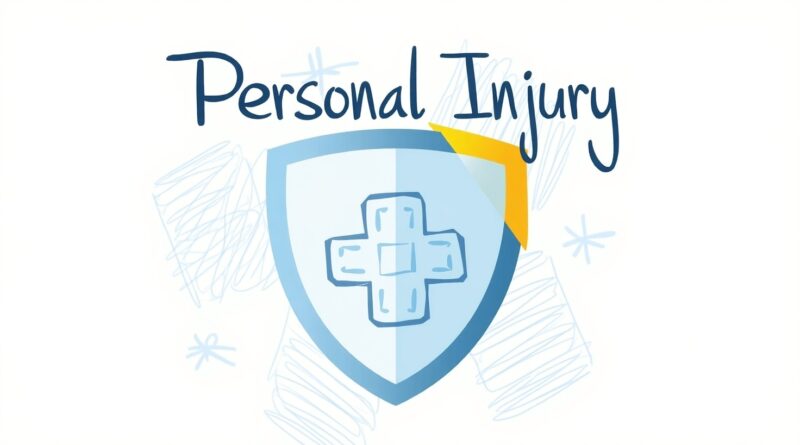Personal Injury Loan: What It Is, How It Works, and If You Should Apply
When you’re injured in an accident that wasn’t your fault, the last thing you should have to worry about is money. But for many people, the financial stress of lost wages, medical bills, and legal fees quickly piles up. That’s where a personal injury loan comes in.
This type of funding is designed to help you stay financially afloat while your lawsuit is pending. But is it right for you? In this guide, we’ll break down exactly how it works, who qualifies, and what you need to consider before applying.

What Is a Personal Injury Loan?
A personal injury loan, also known as a pre-settlement loan or lawsuit cash advance, is a financial tool that helps plaintiffs cover living expenses while waiting for their legal case to settle. The biggest benefit? You don’t need a job, a good credit score, or any form of collateral to qualify.
This loan is considered non-recourse, meaning if you don’t win your case, you’re not responsible for repaying it. It’s basically an advance against your future settlement.
Lawsuit loans are most often used by individuals dealing with personal injury claims, but they can also apply to wrongful death suits, employment lawsuits, and product liability cases.
How Does a Personal Injury Loan Work?
Let’s break it down step-by-step:
- Filing the Lawsuit: You must have an active personal injury lawsuit filed in court.
- Hiring an Attorney: You must be represented by a contingency-fee lawyer (they only get paid if you win).
- Apply for Funding: Submit an application to a legal funding company.
- Case Review: The lender works with your attorney to assess the strength and potential value of your case.
- Approval and Funding: Once approved, funds are transferred to your bank account—usually within 24 to 48 hours.
- Repayment: You only repay the advance (plus interest/fees) once you win or settle your case. If you lose, you owe nothing.
Who Is Eligible for a Personal Injury Loan?
Eligibility is based more on your lawsuit than on your financial background. Most lenders look at:
- Type of case (car accident, slip and fall, etc.)
- Likelihood of winning or settling
- Estimated value of the settlement
- Whether you’re represented by a qualified attorney
Some lenders may also consider how far along your case is and whether liability has been clearly established.

Common Types of Cases That Qualify
Here are the most common lawsuits eligible for pre-settlement funding:
- Car accidents
- Motorcycle or truck accidents
- Pedestrian injuries
- Slip and fall cases
- Construction site injuries
- Medical malpractice
- Product liability
- Nursing home abuse
- Workplace accidents
- Wrongful death
If your case falls into any of these categories, you’re likely eligible for a personal injury loan.
Pros of Getting a Personal Injury Loan
There are several reasons why plaintiffs consider these loans:
1. No Risk to You
If your case fails, you don’t have to repay the loan. It’s risk-free in that sense.
2. Fast Access to Funds
You can receive the funds within one or two days, providing immediate relief from financial stress.
3. No Employment or Credit Checks
Unlike bank loans, there’s no need to prove income or good credit.
4. Flexibility in Spending
Use the money however you want—for rent, food, car repairs, medical bills, or other personal needs.
Cons of Personal Injury Loans
These loans are helpful, but they do come with drawbacks:
1. High Fees and Interest Rates
Legal funding isn’t regulated like other financial products. Some companies charge 30% to 60% interest annually.
2. May Reduce Final Settlement
Whatever you borrow (plus fees) will be deducted from your settlement.
3. Limited Availability
If your case is weak or lacks clear evidence, you may be denied.
How Much Can You Borrow?
Most funding companies offer loans ranging from $500 to $100,000, depending on the expected value of your case. A general rule: lenders will advance about 10% to 20% of the estimated settlement.

What to Consider Before Applying
Before jumping into a lawsuit loan, think carefully:
– Is your case solid?
A strong case means higher chances of approval and better loan terms.
– Do you absolutely need the money?
If your financial situation is manageable, consider avoiding the high interest.
– Can you negotiate the terms?
Always read the agreement. Some lenders are open to fee negotiations.
– Are there alternative sources of help?
Look into disability benefits, community aid, or payment plans with medical providers.
How to Apply for a Personal Injury Loan
Here’s a typical application process:
- Choose a Reputable Legal Funding Company
Search for well-reviewed, transparent, and licensed lenders. - Get Your Lawyer Involved
Your attorney will submit documents like the complaint, police reports, medical records, and legal strategy. - Wait for Evaluation
Most companies approve applications within 24–48 hours after reviewing your file. - Receive Your Funds
Money is wired directly into your bank account. There are no monthly payments—you only pay if you win.
Real-Life Example
Sarah’s Story:
Sarah was injured in a car accident caused by a distracted driver. Unable to work and facing a mountain of medical bills, she applied for a $5,000 personal injury loan. She received the money within 48 hours and used it to pay rent and utilities. A year later, her case settled for $75,000. After repaying the lender $6,500, she walked away with over $68,000—and peace of mind.
FAQs
Q1: What happens if I lose my lawsuit?
A: You owe nothing. That’s the benefit of non-recourse funding.
Q2: Is it legal to take a lawsuit loan?
A: Yes, but not in every state. Check your local regulations.
Q3: How soon can I get my money?
A: Some companies fund within 24 hours of approval.
Q4: Can I take more than one loan?
A: Yes, but only if your case value supports it. Multiple loans reduce your final payout.
Q5: What should I look for in a lender?
A: Transparency, low fees, customer reviews, and direct communication with your lawyer.
Final Thoughts: Should You Apply?
A personal injury loan can be a smart solution when you’re out of options and bills keep piling up. But it’s not free money. Make sure your case is strong, your need is urgent, and you fully understand the loan terms.
Consult your attorney and don’t rush the process. A good legal funding company will work with your legal team to ensure the loan fits your situation. In the right hands and the right circumstances, it can offer relief and security when you need it most.

